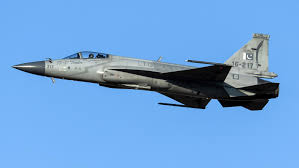Iran sets sight on Pakistan’s JF-17 fighter jets
With growing tensions in the Middle
East between Israel and several Arab countries, many of these nations are
seeking ways to counter Israel's military power. However, their efforts are
hindered by a lack of advanced weaponry.
While some Western countries and
NATO allies, such as Egypt and Turkey, have the capability to provide military
support, they remain unwilling. As a result, these countries have increasingly
turned to China and Russia for arms.
In light of these developments, Iran
has renewed its interest in Chinese fighter jets. In 2021, Iran attempted to
acquire J-10 aircraft from China, but the deal was complicated by Iran’s
financial challenges. While China initially considered a barter agreement, it
ultimately required cash payments, leading to the deal’s collapse. Tehran is
now reportedly exploring the possibility of acquiring 36 J-10C jets, but
funding remains a critical hurdle.
Read More JF-17
fighter jet gaining traction in the developing world
More recently, Iran has expressed
interest in Pakistan’s JF-17 C Block III fighter jets, known for their
affordability and advanced capabilities. Jointly developed by Pakistan
Aeronautical Complex and China Aerospace Corporation, the JF-17 is a popular
choice for countries looking to modernize their air forces without the high
costs associated with Western fighter jets like the F-35 or Russian jets like
the Su-57.
The JF-17 C Block III boasts features
such as an active electronically scanned array radar, beyond-visual-range
missiles, a helmet-mounted display system, and integrated electronics. These
capabilities make it suitable for both air-to-air combat and precision ground
attacks. Countries such as Azerbaijan, Myanmar, and Nigeria have already
incorporated the JF-17 into their fleets, with more Block III deliveries
expected soon.
If Iran’s request for the JF-17 is
successful, it would signal a notable shift in regional power dynamics. The
addition of advanced Turkish subsystems, which include avionics and other key
components, enhances the JF-17’s combat effectiveness and would significantly
upgrade Iran’s air force capabilities.
Read More Pakistan
signs deal to supply JF-17 Block-III fighter jets to Azerbaijan
Given ongoing Western sanctions,
this potential deal could strengthen Iran’s defense capabilities without
drawing the scrutiny of the U.S. or European countries. With advanced avionics,
beyond-visual-range capabilities, and radar technology, the JF-17 C Block III
would enable Iran to counter threats from regional adversaries like Israel and
Saudi Arabia, thereby reinforcing its air power in the region.
Priced at around $25 million per
plane—about half the cost of an F-16—the JF-17 offers a cost-effective solution
for Iran. However, the total deal price could increase when factors such as
training, spare parts, missiles, and other essentials are considered. If Iran
proceeds with the acquisition, it could signal a notable shift in regional
alliances and military capabilities.
Source: https://jetlinemarvel.net/
